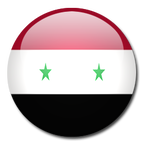International Headteacher
Menu
Full name: The Syrian Arab Republic
Population: 22.5 million (UN, 2010)
Capital: Damascus
Area: 185,180 sq km (71,498 sq miles)
Major language: Arabic
Major religions: Islam, Christianity
Life expectancy: 74 years (men), 78 years (women) (UN)
Monetary unit: 1 Syrian pound = 100 piastres
Main exports: Oil, gas
GNI per capita: US $2,790 (World Bank, 2010)
Internet domain: .sy
International dialling code: +963
Population: 22.5 million (UN, 2010)
Capital: Damascus
Area: 185,180 sq km (71,498 sq miles)
Major language: Arabic
Major religions: Islam, Christianity
Life expectancy: 74 years (men), 78 years (women) (UN)
Monetary unit: 1 Syrian pound = 100 piastres
Main exports: Oil, gas
GNI per capita: US $2,790 (World Bank, 2010)
Internet domain: .sy
International dialling code: +963
|
Once the centre of the Islamic Empire, Syria covers an area that has seen invasions and occupations over the ages, from Romans and Mongols to Crusaders and Turks.
A country of fertile plains, and mountains and deserts, it is home to diverse ethnic and religious groups, including Kurds, Armenians, Assyrians, Christians, Druze, Alawite Shias and Arab Sunnis, the last of who make up a majority of the Muslim population. Modern Syria gained its independence from France in 1946 but has lived through periods of political instability driven by the conflicting interests of these various groups. From 1958-61 it united with Nasser's Egypt, but an army coup restored independence before the Alawite-controlled pan-Arab Baath (Renaissance) party took control in 1963. It has ruled ever since, although the 2011 uprising has cast doubt on its longevity. Baath government has seen authoritarian rule at home and a strong anti-Western policy abroad, particularly under President Hafez al-Assad from 1970. In 1967 Syria lost the Golan Heights to Israel after the Arab defeat in the Six Day War, but civil war in neighbouring Lebanon allowed it to extend its political and military influence. Syria pulled its forces out of Lebanon in 2005, having come under intense international pressure to do so after the assassination of Lebanese former premier Rafik Hariri. A UN report implicated Syrian and pro-Syria Lebanese officials in the killing, although Damascus still denies any involvement. The government has dealt harshly with domestic opposition. Tens of thousands are estimated to have been killed in the crackdown on the 1982 uprising of the Muslim Brotherhood in Hama. Following the death of Hafez al-Assad in 2000 Syria underwent a brief period of relaxation. Hundreds of political prisoners were released, but real political freedoms and a shake-up of the state-dominated economy never materialised. In 2011-12 security forces used tanks, gunfire and mass arrests to try to crush anti-government street protests inspired by the Arab Spring that toppled the leaders of Tunisia, Egypt and Libya. These protests rapidly took on a more formal nature when the opposition began to organise political and military wings for as long uprising against the Baath government. On the world stage Syria has been increasingly isolated in recent years, having come under fire for its support for insurgents in Iraq and over its role in Lebanon. That isolation showed signs of easing after efforts by France to bring Syria back into the international fold in 2008, but allegations of Syria's violation of a UN ban on arming the Lebanese Hezbollah militia led to the extension of US sanctions in May 2010. Further international sanctions were imposed amid the bloody crackdown on protesters in 2011-12. Syria is one of Israel's most intransigent opponents, and supports a number of armed groups that carry out attacks against Israel. Hopes for reconciliation have repeatedly foundered over the Golan Heights. |
information provided by www.bbcnews.co.uk

